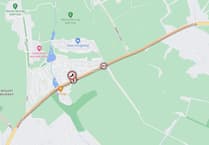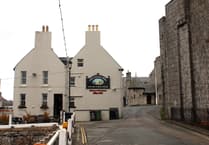It is creditable that our island has acquired ‘Biosphere’ status; endorsing its unique history, culture and environment.
However, many of us who have a keen interest in local nature are beginning to question our government’s commitment to this valuable accreditation.
Hartford Homes in collaboration with the current owner/occupier of ‘Netherby’, Douglas Road, Malew, have recently been granted permission to destroy an extensive amount of established woodland in an area directly to the north of Brookfield Avenue in Castletown, in line with their development plans for the area (21/01567/B).
In their report, Hartford Homes state that the removal of these trees will require the planting of 57 new saplings to balance their ‘ecological calculation’.
Importantly however is that the tree canopy of several hundred square meters will be eradicated, and it will take a minimum of 40 to 50 years to recover this loss of canopy cover and the essential sequestration of carbon from the atmosphere.
It is pertinent to note the recent report by the Intergovernmental Panel for climate change which raises concern regarding the continuing increase in levels of carbon dioxide and volatile organic compound molecules into the atmosphere resulting in the acceleration of global warming.
This valuable woodland area consisting of a mixture of coniferous and deciduous hardwood trees is rich in biodiversity and offers a safe haven for nesting birds such as redwing, blackaps and many others as they migrate across the Irish Sea and the southern plain at Derbyhaven and Ronaldsway.
They rest in this woodland, replenish their energy reserves from the surrounding available seeds and berries before relocating further inland prior to completing their migration to the South of Ireland in late winter.
There is also a long established colony of bats which roost in this woodland.
In their report, Hartford Homes state that they will install bat boxes in all their new properties to accommodate the loss of habitat. However, I have spoken to my retired work colleague and government analyst Bernard Irving, a founder member of the Manx Bat Group, who has spent many evenings at my home surveying the local colony he assures me that the current population will not relocate to bat boxes as they have a strong homing instinct. Due to the disruption and noise they will simply disperse and die off.
In regard to Netherby House itself, this is a well-constructed and attractive property which has been sympathetically extended and well maintained by the current owners...it most certainly does not merit being demolished.
In their report, Hartford Homes repeatedly underline their focus on environmental sustainability and the current ‘Green climate agenda’.
Well, there is nothing environmentally acceptable about destroying a sound and attractive property. Indeed just the opposite.
I can only conclude that this entire development project is based on a combination of opportunism and speculation.
The legal status regarding this development plan is also questionable, as Netherby is classified as ‘open space’ with the added protection afforded to the area by Clause 3.25.3 Green Gap Proposal 3 in the Apra Plan for the South which states ‘Between Castletown and the airport/Business Park, development which would erode the separation and detract from the openess between the two areas will not be permitted’.
Indeed, Sarah Corlett, the previous senior planning officer refused a previous application on this site which was submitted in March 2014 with regard to the above clause...but hey-ho; which government minister or member has the strength of character to challenge any of the decisions which favour development companies on this island.
This decision sets a dangerous precedent that any area which is classified as ‘open space’ may well be developed in the future.
What a frightening concept for those of us who care about our countryside.
I work with many young Manx students who are actively pursuing technical and engineering apprenticeships, aided financially by the government training programme at the Isle of Man University College.
It is extremely disappointing that once these intelligent and hard-working young Manx people complete their apprenticeship scheme, within two or three years, the vast majority relocate off-island because they cannot afford the extortionate cost of either rental or purchase of property.
The current policy of permitting and actively encouraging development companies to build properties purely in order to accommodate wealthy new residents; mainly of the retired generation, to invest in the ‘buy to let’ market requires urgent government intervention and legislation in my view, expedite against the severe emotional and social damage it is creating; resulting in the displacement of 30 per cent of young Manx people under the age of 28 during the last three years.
It is extremely sad when talking with these polite and hard-working young people that they report a widespread feeling amongst their generation of abandonment by society, particularly in the way that development companies seem to have a corporate control and dominance of policy on their island.
Unfortunately this is leading to increased levels of stress, anxiety and depression; and constitutes an appalling and major social crisis both for the young people concerned; and the wider economy.
Indeed, the question needs to be asked: how have we created a society on this island whereby an entire generation have no hope for the future?
This small island has absorbed many thousands of new residents to its shores during the last 40 years. So great are their numbers that our essential infrastructure - such as water supply and effluent streams - are no longer able to function effectively and our quality of life is in rapid decline.
Unfortunately, a significant number are not content with enjoying the Manx tax advantages that the island offers and the relative safety afforded to them by our low level of crime.
Conversely, they clearly demonstrate a frenzied determination in formulating action programmes in extending their wealth, with no regard or respect for the island’s countryside, history and culture.
Finally – only after the last tree has been cut down, only after the last river has been poisoned, only after the last bird and fish have been killed, and the last square inch of our small and fragile island has been covered in concrete – only then will development companies and their associates find that money cannot be eaten.
N.C. Walls
Castletown
This letter was first published in the Isle of Man Examiner of May 9.
Share your views with our readers.
Write to: Opinions, Isle of Man Examiner and Manx Independent, 18 Finch Road, Douglas, IM1 2PT or email:
Don’t forget to include your name, FULL home address and a daytime phone number even if you want to be anonymous in print.
Obviously, we need to be able to verify the identity of everyone whose letter we publish.
We don’t print phone numbers or full addresses and respect anonymity if the author requests it.




